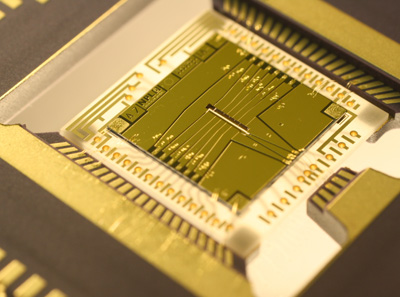A research team from the National Physical Laboratory (NPL) has developed a first-of-its-kind monolithic three-dimensional (3D) ion microtrap array that may be scaled up to confine several tens of ion-based quantum bits (qubits).
 Semi-conductor chip used by scientists at the National Physcial Laboratory to test the first scalable 3-D ion microtrap. (credit: National Physical Laboratory)
Semi-conductor chip used by scientists at the National Physcial Laboratory to test the first scalable 3-D ion microtrap. (credit: National Physical Laboratory)
In a paper reported in the Nature Nanotechnology journal, the research team described the process of realizing this tool embedded in a semiconductor chip and demonstrated the chip’s ability to trap single ions at the nanoscale.
The monolithic ion microtrap array integrates a near perfect 3D geometry with a scalable production process, which is a significant progress in this field. With respect to basic operating properties, the microtrap chip outclasses other scalable devices for ions.
The research team fabricated the microtrap chip from a silica-on-silicon wafer utilizing an innovative method based on traditional semiconductor fabrication technology. The team was able to trap single and sequence of about 14 ions in one segment of the array. The fabrication technique must allow for device scaling to deal with more number of ions without sacrificing the capability of controlling each of them individually.
The remarkable development in nanotechnology allows for scaling up the power of traditional processor chips in accordance with Moore's Law. Although quantum processors are in the nascent stage, the NPL microtrap chip is a significant progress for scaling up such devices for ion-based qubits.
NPL’s Principal Scientist, Alastair Sinclair stated that the research team was able to fabricate a key tool or device that is essential for cutting-edge research and advancement in quantum technologies. This device lays the cornerstone for a future atomic clock device with application for timing, location and navigation services or for a future quantum processor chip build upon trapped ions, thus paving the way to a quantum computer as well as a quantum information network.